

| Earthenware attributed to both Indians and African Americans | |
|
Marcia Bakry, Computer-Enhanced Line Drawing. Courtesy Theresa A. Singleton |
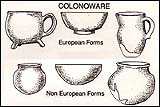 |
| Indian Foods | |
|
Courtesy, Robert Llewellyn, Drawer L., Charlottesville, VA 22903 |
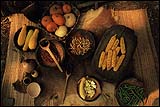 |
| The Arrival of the Englishmen in Virginia | |
|
From Thomas Harriot, A Briefe and True Report. |
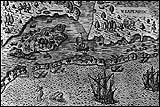 |
| "Stowage of the British Slave Shipe Brookes," ca. 1790 | |
|
Broadside, Rare Book Room, Library of Congress, Portfolio 282-43, Courtesy: Jerome S. Handler The ship Brooks, constructed at Liverpool in 1781, made slaving voyages from Africa's Gold Coast to Kingston, Jamaica in 1781, 1783, 1785, and 1786. In 1788, the Brooks was one of nine slaving vessels measured at the request of Parliament while it was "laid up" in Liverpool. It measured 297 tons with main, lower, quarter, and half decks, a cabin, gun room, gratings, and slave compartments for African men, boys, and women. The lower deck was 100 feet in length and 25 feet four inches wide, and the height between main and lower decks measured five feet eight inches. Wooden platforms built between these two decks and under the half deck allowed more slaves to be carried until 1788 when the British government regulated the capacity of slave-carrying vessels. British abolitionists printed a placard of the Brooks (mistitled "Brookes") to circulate in order to show how, even after the new regulations, the ship still crowded 292 slaves on the lower deck, 130 on the wooden platforms, and 20-30 slaves under the poop deck (compared to as many as 740 on one voyage before the regulations). This image became a popular propaganda device with distribution to hundreds of British cities. The Brooks continued to be used as a slave ship until its last voyage in 1804 when it was captured and held by authorities in Buenos Aires. Source: David Eltis, Stephen D. Behrendt, David Richardson, and Herbert S. Klein, The Trans-Atlantic Slave Trade: A Database on CD-ROM (Cambridge: Cambridge University Press, 1999) |
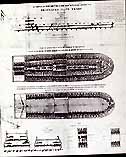 |
| William Buckland's Indenture | |
|
Gunston Hall |
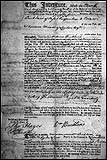 |
| The Interesting Narrative of the life of Olaudh Equiano" | |
|
Bodleian Library, University of Oxford. Read a section of his firsthand account of the Middle Passage. |
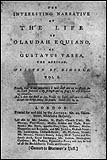 |
| "Towne of Secoton" | |
|
From Thomas Harriot, A Briefe and True Report |
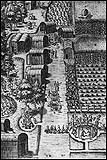 |
| Powhatan's Mantle | |
|
Ashmolean Museum, Oxford, England |
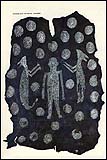 |
| Pocahontas | |
|
Matoaka as Rebecca by Simon van de Passe (1616) |
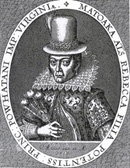 |
| John Smith's General Historie | |
|
|
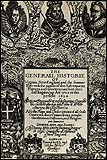 |
| Virginia Company Coat of Arms | |
|
From John Stow, The Survey of London. 1633. |
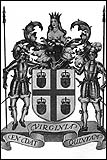 |
| Arrival of Lord del la Warr | |
|
Courtesy National Park Service |
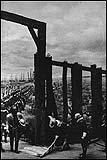 |
| Godspeed visiting Washington, D.C. | |
|
Washington Post-Times Herald. |
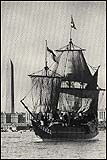 |

|
|
|
©Crandall Shifflett |